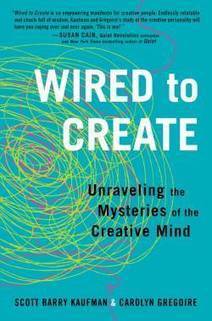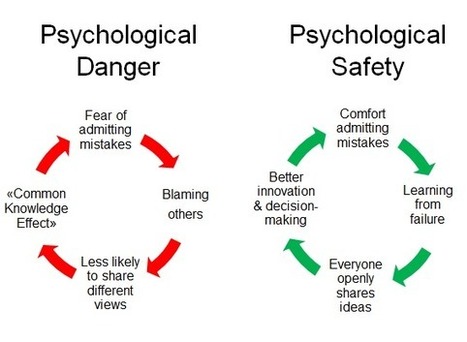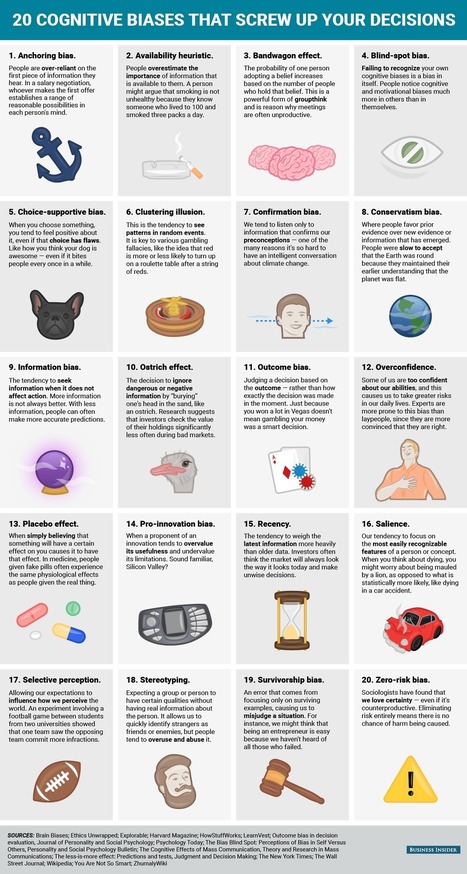 Your new post is loading...
 Your new post is loading...
Of all the things you learned in school, chances are the right way to learn wasn’t one of them. To make it through academic life, most of us opt for what psychologists call “massed practice,” better known as cramming: It’s Monday and your test is Friday, so you save studying for the night before. One four-hour session can nab you a passing grade, so why not? Well, because that’s not how your brain likes to absorb information. You might remember enough to pass your exam the next day, but just a week or two later and the details will already be fuzzy, if not gone completely. Here’s how to do better.
Via The Learning Factor
Many people spend their days sitting at their desks alone as it is–communicating through email, Slack, or text rather than in person, and leaving little opportunity to feel as though they’re pulling together as a group. Even in a busy environment like a bar, colleagues might not get to interact much amid the chaos of a full house. Taking time to give back through collaborative volunteer work breaks the normal cycle of work. It gives team members a chance to reestablish their connections with each other without having to achieve a particular goal in their own workplace. And it can reinforce collegial relationships even after everyone returns to work, because they’ve contributed to a goal that’s actually meaningful. That’s far better than just going to some strange corporate retreat where you solve a pointless but difficult problem and leave without making any lasting impact.
Via The Learning Factor
If you feel like most of your meetings at work are a waste of time, the good--and bad--news is that you're onto something. One survey found that 50 percent of meeting time is unproductive while up to 25 percent of meetings are spent on irrelevant issues. The same way we put deliberate thought into building businesses for our customers, we need to be intentional about planning meetings for their participants. A successful meeting is designed with its participants in mind. Here are four tips for designing a brain-friendly meeting.
Via The Learning Factor, Mark E. Deschaine, PhD
There’s a growing body of research about how counterproductive multitasking can be. While we may feel like we’re getting more done, the reality is that regular multitasking can leave us with a diminishing ability to focus. That’s good to know. But if you’re a chronic multitasker who finds it hard to focus, is there any hope of getting your attention span back? While neuroscientist Daniel Levitin, psychology professor at McGill University in Montreal and author of This Is Your Brain on Music: The Science of a Human Obsession won’t speak definitively for everyone, he says there are some general things most of us can do to improve our focus. Put these practices into place to sharpen your concentration and be more effective.
Via The Learning Factor
One of the key roles any leader plays is finding ways to motivate your team to reach your organization's goals. But the secret to motivating people is, wait for it .....that you can't do it. I have studied this issue by talking to and working with thousands of people over many years and the one thing everyone can agree on is that you can't motivate someone to do what they don't want to do. What you need to do instead is find out what people want and then show them how they can get it. Motivation is intrinsic. People get excited about pursuing a goal when it's in their own self-interest. As a leader, the trick is to see if you can find an alignment between what your people want and what will help grow the organization. The upside is that if you can tap into the underlying desires people have, you will get amazing performances in return from them.
Via The Learning Factor
Emotional intelligence predicts people’s ability to regulate themselves, manage other people, and achieve success. Research shows a link between emotional intelligence and career success. Not everyone is born with it, but unlike IQ, emotional intelligence can be acquired and improved with practice. So, how can we tell if someone’s got it or not? Here are five signs of people with high emotional intelligence. These are qualities that are easy to assess in every day situations. Sign No. 1: They handle criticism without denial, blame, excuses or anxiety. One of the hallmarks of high emotional intelligence is self-awareness. Self-awareness is a deep understanding of what makes us tick; what angers us, makes us happy, bores and interests us. It’s also means that we can appraise ourselves, faults and all, with great honesty and clarity. So when people with high emotional intelligence make a mistake and get criticized for it, it doesn’t send them into an emotional tailspin. It’s simply a fact to be noted, analyzed and corrected.
Via The Learning Factor
Following on from my previous blog about Strengths At Work, I wanted to continue the series by starting to look at each strength from the VIA classification of strengths, beginning in this article about the strength of Appreciation of Beauty and Excellence. The VIA definition of the strength of Appreciation of Beauty and Excellence is …
Via Sandeep Gautam
Procrastination is a skill, an art, a slight-of-hand technique. I’m procrastinating right now, but you’d never know it. How many tabs do I have open in my multiple browser windows? Pick a number, any number. How many tasks have I put off today? How many dreams have I deferred? I’ll never tell.
Via Anne Leong
There’s a disturbance in the workforce—a lot of them, actually. You know the ones: the persistent ding of social media alerts, the unending stream of “urgent” emails, the cubicle mate who conducts every call on speakerphone. How can we get any work done with so many distractions afoot? The answer is that most of us aren’t accomplishing as much as we could be. Research from the University of California, Irvine, found that the typical office worker spends only 11 minutes on a task before getting interrupted or abandoning it for another project. And once workflow has been disrupted, it can take about 23 minutes to get back on track, explains professor Gloria Mark, who led the study.
Via The Learning Factor
When you experience rejection, it’s natural to take certain measures in order to preserve your self- esteem, like trying to fit in with a social group and gain their approval. However, research has shown that people who view themselves as independent may be somewhat immune to the negative effects of rejection, and may even use social rejection as creative fuel. Sharon Kim and her colleagues, who conducted the study, hypothesized that these boosts in creativity were fueled by a differentiation mind- set, or as they put it, “salient feelings of being different from others.” Independent people not only may be resistant to the negative consequences of rejection but indeed may be strengthened by experiences that reaffirm their sense of independence. As Kim puts it, “Independent selves are motivated to remain distinctly separate from others.” This motivation may, in turn, trigger psychological processes that boost creative thinking. Rejection is not just a catalyst for creativity—it can also be a by-product of it. As the study’s authors write, “The very traits that distinguish highly creative people, such as unconventionality, make them easy targets for rejection.” Learn more / En savoir plus / Mehr erfahren: http://www.scoop.it/t/21st-century-learning-and-teaching/?tag=Creativity https://gustmees.wordpress.com/?s=creativity http://www.scoop.it/t/21st-century-learning-and-teaching/?tag=Sir+Ken+Robinson
Via Gust MEES, Mark E. Deschaine, PhD
Cornell professor Kathleen O’Connor, who coaches teams on effective collaboration, says that when psychological safety is absent from the workplace, teams lose the individual knowledge and expertise each member brings to the table and begin to experience what is known as the Common Knowledge Effect.
When this effect is at play, says O’Connor, “teams tend to focus on shared information”, and as a result they have “trouble capitalizing on the diversity of knowledge and expertise in the team”. The very same knowledge and expertise those people were recruited for to begin with. This often leads to poor performance, poor decision-making and missed opportunities for innovation.
Via Gust MEES
Is there a colleague with whom you have a strained working relationship? If, by chance, you are some kind of work superhero who just answered “no” to that question, is there at least someone with whom you would like to have a better relationship? If so, please ask yourself the following questions in relation to that person: Do you notice him as he truly is today, or based on your memory of how he was last week or last month – or even last year?When you have a conversation with him, is your only aim to change his mind? Or also to change your own?When you see his name in your inbox, do you already have a “story” about him, before even opening the email? These issues get to the heart (and brain) of executive mindfulness. While we know from research that mindfulness is good for us, what seems to be missing from the conversation is how one might be mindful at work, without meditating at our desks or breaking into a sun salutation. But an understanding of mindfulness – how it really operates in the context of daily work activities – is essential to good working relationships; relationships that let both us and our coworkers grow and change over time.
Via The Learning Factor
|
Although breakthroughs have been made in explaining why people think and behave as they do, these insights have in general been applied to business only piecemeal and haven’t had a widespread effect. Recently, however, several companies have found that linking all of the major discoveries together in programs to improve performance has brought about startling changes in the behavior of employees—changes rooted in new mind-sets. Performance-improvement programs that apply all of these ideas in combination can be just as chaotic and hard to lead as those that don’t. But they have a stronger chance of effecting long-term changes in business practice and thus of sustaining better outcomes.
Via David Hain
We might spend days, months, or even years trying to figure someone out. Is he who he says he is? Should I trust her? The wheels in our head spin as we think of all the variables and how they'll play out. And still, we keep hearing that we should just listen to our instincts. Complicated questions, simple answer. What should we do, and where did this whole idea of the gut instinct come from, anyway? Intuition isn't some magical, mysterious quality that we carry with us. It actually comes from the knowledge and past experiences that we all carry. Even if we're unable to explain why we feel the way we do, there's a logical explanation behind our gut feelings. Whenever you encounter anything new, the unconscious side of your brain is constantly making assessments. It takes in certain cues, such as a smile or parts of a story, and then matches it with something similar in our database of memories to come up with a conclusion. Meanwhile, our conscious side remains unaware of this rapid process taking place.
Via The Learning Factor
It’s no secret that technology advancements have affected our brains. With instant messages, push notifications, wearable technology, and many other tech-driven distractions, the pace at which we are expected to respond has accelerated. We’re multitasking with unfortunate effects. How much more can our brains take? And is it possible to future-proof them for all the technical advances yet to come? Performance expert and Australian medical practitioner Jenny Brockis, author of Future Brain: 12 Keys to Develop Your High-Performing Brain, thinks so. Our brains are designed to adapt, but there’s a difference between adjusting to change and expecting an organ to endure relentless stress without time to renew, she says. So the first step to future-proofing our brains lies in good physical care, including nutrition, exercise, sleep, and downtime, she says.
Via The Learning Factor
It's a fancy word that means pondering past experiences -- often, our mistakes -- over and over. It could be something you said. Something you did. Something you didn't do. Whatever the reason, we as human beings spend a lot of time dwelling on our past. And science says 70 percent of the time we only relive the negative aspects of our lives. Why do we have such a hard time letting go? Perhaps it's because, deep down, we're wired to be problem solvers. We need to make meaning out of negative experiences. But obsessing over a mistake won't change the past. It won't solve the problem. It will make it worse (according to psychologists at Yale and the University of California). These psychologists say that living a mistake over and over impairs our problem solving abilities. It leads to increased negative thoughts and depression. It even erodes our support network -- no one wants to hear from the person who can't let things go. In short: Dwelling on past mistakes puts us in, and keeps us in, a bad state. The very thing we're trying to get out of.
Via The Learning Factor
When we think of the benefits of good posture, we almost always only consider the musculoskeletal: fewer aches and pains due to less stress on the joints and muscles of the body. Yet in recent years, researchers are finding myriad other benefits to maintaining good posture while sitting, standing, and walking. Good posture, it turns out, is not only good for your body, but your brain and your productivity as well. What most people do not realize is that posture communicates our capabilities and worth to others and also affects our own psychophysiology. A 2009 study published in the European Journal of Social Psychology revealed that sitting up straight and sticking your chest out can boost self confidence, while slouching can lead to negative thoughts. Another study found that good posture actually increases your productivity and creativity.
Via The Learning Factor
There is a world of difference between normal activity and peak performance. It’s the glimpses into the peak state that fuel the intuition that we’re meant for greater things. In this article, we’ll take a look at peak performance and a surprisingly simple strategy for more consistently tapping into our peak mode. The Psychology of Peak Performance Two elements turn ordinary activities into performance activities: 1) we keep score of the outcomes that matter and 2) we institute practice measures to systematically pursue the improvement of our scores. Such deliberate practice lies at the heart of the development of chess players, athletes, Broadway stars, and elite medical facilities. Once we keep score and devote ourselves to a continuous improvement in what we do and how we do it, we transform routine into growth. Recreation is not a cumulative activity. It is activity pursued at the time for its own sake. Peak performance, on the other hand, is cumulative: it’s a focused, ongoing attempt at improvement. We can go to the gym for enjoyment or we can go to the gym to train for aerobic conditioning. The first activity is expressive and present-centered; the second is instrumental and forward-focused.
Via The Learning Factor
Incompatibility has the potential to derail even the simplest of projects.
Via Sandeep Gautam
Five insightful ideas for inserting positivity into your workplace from Industrial/Organizational Psychologist, Dr. Marla Gottschalk.
How to use 'Acceptance and Commitment Training (ACT) in coaching to help people gain greater psychological flexibility.
It’s hard not to resent Mondays. The day marks the end of the fun and freedom of the weekend—and that’s especially true during the summer, when ordinary Saturdays and Sundays have a carefree vacation vibe. Even if you love your job, the angst of having to go back to the grind on Monday can leave you disorganized and spinning your wheels all day, explains Richard Citrin, Ph.D., MBA, an organizational and consulting psychologist and author of “The Resilience Advantage.” Then you have to spend the rest of the week playing catch up. But while Monday is going to happen whether you like it or not, that lack of productivity doesn’t have to. The key is to adopt a few smart habits on Sunday so you set yourself up for a brighter, more efficient workweek without really cutting into your weekend R&R time. These tips will help you do just that.
Via The Learning Factor
Dr. Bruner helped launch the field of cognitive psychology and was a major educational theorist.
Via David Hain
From cognitive bias to groupthink - this chart shows what could be clouding your thinking
Via Philippe Vallat
|



 Your new post is loading...
Your new post is loading...











































Now I understand my preparation process for any event or task i take on..."The “spacing effect” is one of the most consistently replicated mental processes in psychological history, dating back to Hermann Ebbinghaus, who observed it in 1885.
A four-hour marathon study session (or team meeting or conference presentation) demands a ton of sustained attention, the quality of which will inevitably dwindle the longer those periods last. It simply makes more sense, cognitively speaking, for teams to opt for small doses of high-quality learning–sessions lasting under an hour, with lots of discussion and participation–to make insights stick without taking up much time.